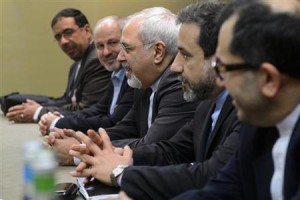 At a meeting in Vienna on Tuesday, negotiators from�Iran�and six world powers will begin hammering out a long-term agreement that would resolve questions related to�Iran�s nuclear programme�in exchange for respecting Iran�s right to use peaceful nuclear technology and a gradual lifting of sanctions.
At a meeting in Vienna on Tuesday, negotiators from�Iran�and six world powers will begin hammering out a long-term agreement that would resolve questions related to�Iran�s nuclear programme�in exchange for respecting Iran�s right to use peaceful nuclear technology and a gradual lifting of sanctions.In the historic November accord that laid the ground for this process, both parties agreed that �the Iranian nuclear program will be treated in the same manner as that of any non-nuclear weapon state party to the non-proliferation treaty�. Yet Wendy Sherman, the US nuclear negotiator, has told Congress she believes that Iran has no need for either a heavy water reactor or the second enrichment facilities in Fordo. She added that Iran should give up some centrifuges. All these demands go beyond the requirements of the NPT.
American insistence on �zero enrichment in Iran� is one reason for the failure of past talks. Last November�s deal was only possible because the US was prepared to be more realistic. A comprehensive agreement must offer something for both sides. Measures that go beyond the NPT may be required for a time to build confidence. But Iran cannot be expected to agree to them forever.
Any deal will have to involve compromise on four main issues. The first is the fate of the heavy water reactor at Arak. The US and its allies worry that plutonium produced there could be used to build a bomb. But the Iranians refuse to dismantle it or convert it into a light water reactor. They say the facility is needed for research and to produce radioisotopes needed to treat cancer patients, and that its purpose is not to make weapons.
The fact is, however, that both heavy and light water reactors can be used to produce plutonium. Iran could allay these concerns by making design changes that would greatly reduce the amount of plutonium produced. Alternatively, it could promise not to build a reprocessing plant of the kind needed to extract plutonium from spent fuel. Or it could ship its spent fuel out of the country as soon as it is cool enough to be transported.
Iran�s second�enrichment site in Fordo�is an equally thorny issue. It was built deep under the mountains to protect it from aerial attack. As long as the US keeps repeating its threat that �all options are on the table�, including military action, shutting down Fordo will be out of question. But Iran could agree to place Fordo under full IAEA surveillance, and accept limitations on what it can do at the facility.
The third issue is how much enriched fuel Iran will produce, and in what concentration. The world powers want to limit enrichment capacity to the equivalent of about 4,000 first-generation centrifuges. Yet Iran already has something like 20,000 centrifuges, of which 9,000 are operating. Providing fuel for a single nuclear power plant would require about 100,000 of these first-generation machines � far more than would be needed to support a small weapons programme. Ironically, the enrichment facilities that the west says it will allow would be only useful for making weapons, not for generating power. One way forward would be for Iran to agree not to enrich uranium beyond about 5 per cent, and to tailor its equipment to the needs of civilian activity.
A final issue concerns international oversight. To resolve concerns about a possible military dimension to Iran�s nuclear programme, Iran could agree for a limited time to give the IAEA more access to its sites than the NPT requires. As part of an agreement, Iran will probably have to accept temporary limitations on its nuclear programme and submit to extra inspections. In return, world powers must respect the country�s right to the peaceful use of nuclear technology, including enrichment. After verifying that Iran has complied with its obligations � a process that could realistically be completed within three to five years � they must lift all sanctions related to Iran�s nuclear programme, withdraw Iran�s nuclear file from the UN Security Council and normalise its relationship with the IAEA.
Some officials in Washington and Tehran feel deceived by the other side and are sceptical of the prospects for the new talks. Allaying those doubts will require compromise � and not only from Iran.
This article was written by Seyed Hossein Mousavian for the opinion page of the Financial Times on February 16,2014.The writer is a research scholar at Princeton, a former spokesman for Iran�s nuclear negotiators and author of �The Iranian Nuclear Crisis�
The Iran Project is not responsible for the content of quoted articles.










